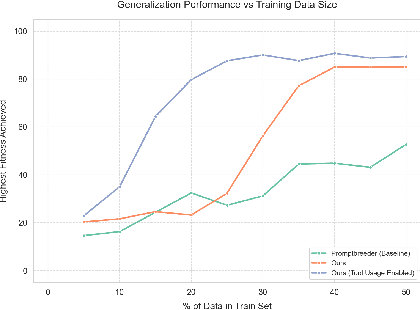Evolutionary Prompt Optimization Discovers Emergent Multimodal Reasoning Strategies in Vision-Language Models
Paper and Code
Mar 30, 2025



We present a framework for optimizing prompts in vision-language models to elicit multimodal reasoning without model retraining. Using an evolutionary algorithm to guide prompt updates downstream of visual tasks, our approach improves upon baseline prompt-updating algorithms, which lack evolution-style "survival of the fittest" iteration. Crucially, we find this approach enables the language model to independently discover progressive problem-solving techniques across several evolution generations. For example, the model reasons that to "break down" visually complex spatial tasks, making a tool call to a Python interpreter to perform tasks (such as cropping, image segmentation, or saturation changes) would improve performance significantly. Our experimentation shows that explicitly evoking this "tool calling" call, via system-level XML $...\texttt{<tool>} ... \texttt{</tool>}...$ tags, can effectively flag Python interpreter access for the same language model to generate relevant programs, generating advanced multimodal functionality. This functionality can be crystallized into a system-level prompt that induces improved performance at inference time, and our experimentation suggests up to $\approx 50\%$ relative improvement across select visual tasks. Downstream performance is trained and evaluated across subtasks from MathVista, M3CoT, and GeoBench-VLM datasets. Importantly, our approach shows that evolutionary prompt optimization guides language models towards self-reasoning discoveries, which result in improved zero-shot generalization across tasks.
 Add to Chrome
Add to Chrome Add to Firefox
Add to Firefox Add to Edge
Add to Edge